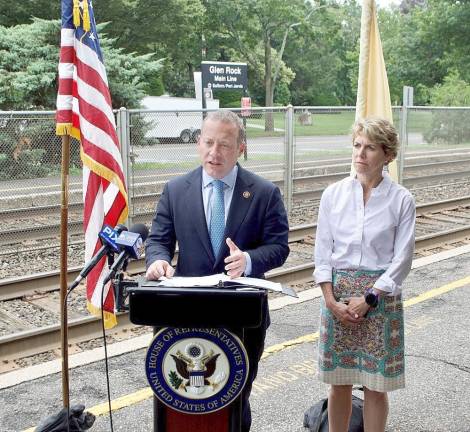‘You can’t have a first-rate state with second-class infrastructure’
Transit. U.S. Rep. Josh Gottheimer outlines how bipartisan infrastructure package will repair and improve New Jersey public transit and commute times.

On Tuesday, July 13, U.S. Rep. Josh Gottheimer highlighted how the bipartisan infrastructure framework will invest in repairing and improving New Jersey public transit — as well as roads, bridges, water, broadband, and tunnels — to help improve commutes for North Jersey residents.
The bipartisan infrastructure package has been agreed to by the White House and a bipartisan group of Senators, and has been formally endorsed by the House Problem Solvers Caucus, which Gottheimer co-chairs. The Problem Solvers Caucus has called for the package to be brought to the House for a vote.
Currently, New Jersey’s public transit trains are ranked the worst in the nation; New Jersey residents who take public transit spend an extra 82.7% of their time commuting; 22% of trains and other transit vehicles in New Jersey are past useful life; New Jersey has the third worst roads in the nation; New Jersey commute times have increased by 8.8% since 2011; more than 500 bridges in New Jersey are currently rated as deficient; a third of New Jersey’s bridges need repairs; more than 3,995 miles of New Jersey’s highways are in poor condition; and the Gateway Project has been stalled for years.
On average, each New Jersey driver pays $713 per year in costs and repairs to their vehicles, due to driving on damaged roads.
“Even before the pandemic, because of outdated technology and train cars and tracks in need of repair, NJ Transit often couldn’t deliver, and far too often, commuters sat delayed, watching the minutes go by getting to work or getting home,” Gottheimer said. “Thankfully, in Washington, there is a bipartisan infrastructure deal — with bicameral support — on the table now, with the backing of the White House, which includes critical investment in New Jersey’s transit system — from the rails and train cars to the Gateway Tunnel. And it’s time to bring it up for a standalone vote, without any delays.”
The Bipartisan Infrastructure Framework will:
Invest more than $312 billion to transform our nation’s transportation infrastructure and make it more resilient, including investing $110 billion in roads, bridges and major projects.
Modernize public transit with a nationwide investment of $48.5 billion, as well as a $66 billion investment in passenger and freight rail — the largest federal investment in public transit in history and the largest federal investment in passenger rail since the creation of Amtrak.
Create good-paying jobs and boost economic growth throughout New Jersey and the region.
The bipartisan infrastructure agreement also includes critical investments like $47 billion to improve the resiliency of our infrastructure and support communities’ recovery from natural disasters; $55 billion to ensure clean, safe drinking water and completely eliminate the nation’s lead service lines and pipes; the largest investment in clean energy transmission in American history; and $65 billion to bring universal, reliable, high-speed, and affordable broadband internet coverage to every family in America.
Gottheimer: Here’s how it will help
“This investment will modernize our public transit, finally improve our roads and bridges and get Gateway back on track, and make our infrastructure and transit resilient for future use — all while greatly enhancing the lives of all our commuters — which is a win-win-win for North Jersey.
“This bipartisan infrastructure agreement is on top of the seven key Fifth District transportation and transit priorities I fought for — submitted from our local governments — that were just passed in the House’s bipartisan INVEST in America Act earlier this month — moving these projects closer to being signed into law and becoming a reality. They include a Mobility Improvement Project in Hackettstown, new overpass and bridge projects in Teaneck, Oakland, and Passaic; rail upgrades in Sussex County, and projects in West Milford and in Andover.
“The bottom line is,” he said. “You can’t have a first-rate state — like I know New Jersey is — with second-class infrastructure.”